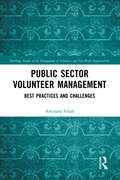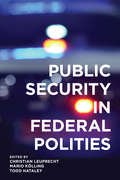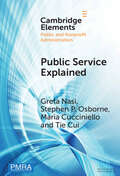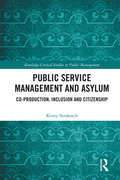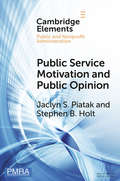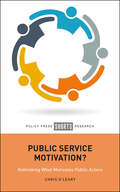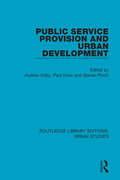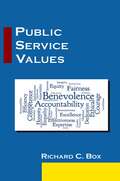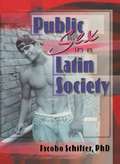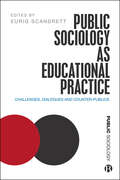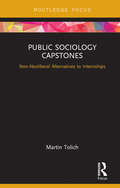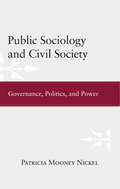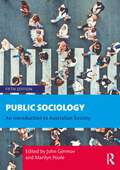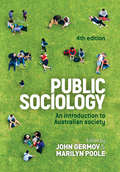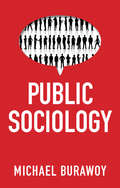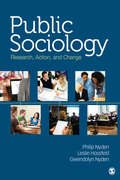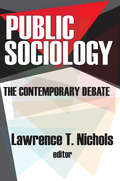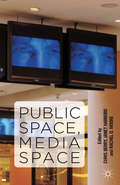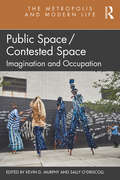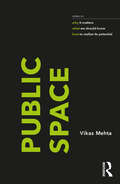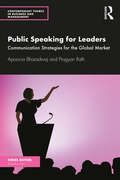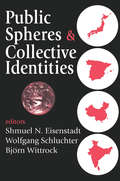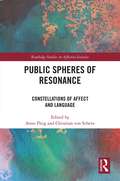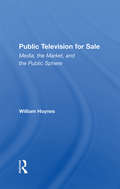- Table View
- List View
Public Sector Volunteer Management: Best Practices and Challenges (Routledge Studies in the Management of Voluntary and Non-Profit Organizations)
by Aminata SillahIn order to effectively and consistently provide services to citizens, local governments have had to come up with creative ways for offering services demanded by their citizens. One popular approach became the creation of volunteer programs as local governments became increasingly reliant on volunteers. Volunteers are one means by which local governments help to increase meaningful engagement with citizens and help meet the increasing needs for public services with limited resources. On a broader scale, volunteers in public agencies provide a variety of services to fill gaps in creating and sustaining collective societal goods that otherwise might have been limited due to fiscal stress on local governments or eliminated. Public Sector Volunteer Management: Best Practices and Challenges adds to the understanding of how management practices may affect retention of volunteers. It provides an opportunity to add much-needed data to any discussion concerning volunteering at the local government level from the perspective of volunteer coordinators and aims to provide in-depth research on local government volunteer management practices. This book focuses on best practices identified as necessary for successful volunteer management in the public sector, specifically in a local government setting, making it a valuable text for researchers, academics, and students in the fields of public and non-profit management, leadership, and human resource management.
Public Security in Federal Polities
by Christian Leuprecht Mario Kölling Todd HataleyPublic Security in Federal Polities is the first systematic and methodical study to bring together the fields of security studies and comparative federalism. The volume explores the symbiotic relationship between public security concerns and institutional design, public administration, and public policy across nine federal country case studies: Brazil, Canada, Germany, India, Mexico, South Africa, Spain, Switzerland, and the United States. In addressing specific national security concerns and aspects of globalization that are challenging conventional approaches to global, international, regional, and domestic security, this volume examines how the constitutional and institutional framework of a society affects the effectiveness and efficiency of public security arrangements. Public Security in Federal Polities identifies differences and similarities, highlights best practices, and draws out lessons for both particular federations, and for federal systems in general. This book is essential reading for scholars, students, practitioners as well as policy- and decision-makers of security and federalism.
Public Service Explained: The Role of Citizens in Value Creation (Elements in Public and Nonprofit Administration)
by Greta Nasi Stephen Osborne Maria Cucciniello Tie CuiThis Cambridge Element aims to advance theory by investigating the nature of participation in public service delivery. It situates itself under the theory of Public Service Logic to advocate for a strategic orientation to participation as an element of value creation in public services. It introduces the concept of participation and discusses the motives, incentives, and tools to engage citizens in public service delivery processes. Then, it frames citizens' participation under the approach public service ecosystem to capture the dynamic relationships among citizens, other actors, processes, and structures that may contribute to determining value in public service delivery. It presents the dynamics of value creation and destruction in public service. The Element concludes with implications for research and practice. This title is also available as Open Access on Cambridge Core.
Public Service Management and Asylum: Co-production, Inclusion and Citizenship (Routledge Critical Studies in Public Management)
by Kirsty StrokoschCo-production occurs when citizens actively participate in the design and delivery of public services. The concept and its practice are of increasing interest among policymakers, public service managers and academics alike, with co-production often being described as a revolutionary solution to public service reform. Public Service Management and Asylum: Co-production, Inclusion and Citizenship offers a comprehensive exploration of co-production from the public administration and service management perspectives. In doing so, it discusses the importance of both streams of literature in providing a holistic understanding of the concept, and based on this integration, it offers a model which differentiates co-production on five levels. The first three refer to the role of the public service user in the design and delivery of services (co-construction, participative co-production and co-design) and the other two focus on inter-organisational relationships (co-management and co-governance). This model is applied to the case of asylum seekers in receipt of social welfare benefits in Scotland to explore the implications for social inclusion and citizenship. It argues that as public service users, asylum seekers will always play an active role in the process of service production and while co-production does not provide asylum seekers with legal citizenship status, if offers an opportunity for asylum seekers to act like citizens and supports their inclusion into society. It will be of interest to researchers, academics, policymakers, public services managers, and students in the fields of public management, public administration, organizational studies.
Public Service Motivation and Public Opinion: Examining Antecedents and Attitudes (Elements in Public and Nonprofit Administration)
by Jaclyn S. Piatak Stephen B. HoltPractitioners, policymakers, and scholars across fields and disciplines seek to understand factors that shape public opinion and public service values, especially in today's polarized context. Yet we know little about how the two relate. Research on public service motivation (PSM), a drive to help others grounded in public institutions, has grown to examine career decisions and behaviors within and outside the workplace, but does the influence of PSM extend to individual values? Using data from the Cooperative Congressional Election Study surrounding the 2016 US presidential election, we first examine the antecedents of PSM; how do individual characteristics as well as socioeconomic and sociocultural factors influence levels of PSM? Second, we describe the role PSM plays in shaping public opinion on policy preferences, budget priorities, and political behaviors. Findings have implications for both understanding who has PSM as well as how PSM shapes public preferences, attitudes, and behaviors.
Public Service Motivation?: Rethinking What Motivates Public Actors
by Chris O'LearyChris O’Leary looks afresh at the reasons for prosocial work choices in the first substantive critique of Public Service Motivation (PSM). With critical analysis of theoretical and empirical research to date, this book explores the pros and cons of PSM and interrogates the reasons why people choose to work in the public and third sectors. It proposes an alternative theory for the pursuit of service, rooted in rational choice theory, that shows public servants are expressly motivated to confirm their values and identity through their work. For those involved in public policy, administration and management, this is a constructive and stimulating review of an important but often neglected aspect of the sector.
Public Service Provision and Urban Development (Routledge Library Editions: Urban Studies #14)
by Paul Knox Steven Pinch Andrew KirbyOriginally published in 1984. The authors of this study address a number of major themes related to the analysis of public services: the role of public choice theory, the importance of professors and organisations, the value of neo-Marxist theories and the importance of space. These issues are considered in the context of case studies of school closures, the provision of medical care, the relationships between Federal outlays and presidential politics, the provision of nurseries, demand-making in local government and the fiscal crisis facing many American cities. The subject of public service provision is of great interest not only to political scientists but also to geographers and to sociologists. This book presents a great deal of new thinking and new research from both North America and Britain.
Public Service Values
by Richard C. BoxPublic service values are too rarely discussed in public administration courses and scholarship, despite recent research demonstrating the importance of these values in the daily decision making processes of public service professionals. A discussion of these very tenets and their relevance to core public functions, as well as which areas might elicit value conflicts for public professionals, is central to any comprehensive understanding of budget and finance, human resource management, and strategic planning in the public sector. Public Service Values is written specifically for graduate and undergraduate courses in public administration, wherever a discussion of public service ideals might enrich the learning experience and offer students a better understanding of daily practice. Exploring the meaning and application of specific values, such as Neutrality, Efficiency, Accountability, Public Service, and Public Interest, provides students and future professionals with a ‘workplace toolkit’ for the ethical delivery of public services. Well-grounded in scholarly literature and with a relentless focus on the public service professional, Public Service Values highlights the importance of values in professional life and encourages a more self-aware and reflective public practice. Case studies to stimulate reflection are interwoven throughout the book and application to practice is cemented in a final section devoted to value themes in professional life as well as a chapter dedicated to holding oneself accountable. The result is a book that challenges us to embrace the necessity of public service values in our public affairs curricula and that asks the important questions current public service professionals should make a habit of routinely applying in their daily decision making.
Public Services in EU Law
by Wolf SauterIn the EU public services, utilities and welfare services can be seen as both building blocks for the internal market and as a persistent irritant in the integration process. This book provides a comprehensive overview of the EU law on public services within the context of European integration. It brings together important analysis of the primary Treaty law, mainly on the internal market and competition, and of the secondary legislation at EU level, including different sector specific regimes. Particular attention is given to case law of the EU courts. This will be essential reading for those looking to have a broader understanding of the subject.
Public Sex in a Latin Society
by Jacobo SchifterExplore the risks and rewards of seeking and having sex in public places!Public Sex in a Latin Society is one of the first books to explore the lives of people who look for sex in public places and the dangers involved--from murder to HIV infection. The book examines why many gay men have been murdered by sex workers who frequent public sex places, such as the parks, bathhouses, or saunas, and suggests some basic safety rules. Containing interviews with police officials, murderers, and sex workers, Public Sex in a Latin Society explores the motivations for seeking public sex, why gay men who have sex in public are sometimes murdered, and how these killings could be prevented. This eye-opening book contains studies that examine mechanisms for assault and crime and examines data on the roles that sexual and physical abuse play in sex workers and their clients. Public Sex in a Latin Society explores Latin society's Catholic church-influenced negative view of homosexuality, explaining why gay men are seen as the equivalent of murderers and thieves, why the topic is censored in the media, and why client murders are rarely investigated.Public Sex in a Latin Society discusses the dangers facing public sex seekers and suggests guidelines, such as: refrain from flaunting wealth or wearing fine jewelry or clothes when looking for public sex to decrease the chances of getting mugged or physically assaulted never try to negotiate changes to the agreement or method of payment after sex--this can bring on physical harm or even death do not make advances or ask for sexual acts that were not agreed upon and be especially careful about everything relating to anal sex never take drugs or drink alcohol while seeking sex in order to be alert if you are attackedPublic Sex in a Latin Society provides you with a shocking analysis of how public sex in Latin America has become part of the Latin economy without advancing sexual liberation or social equality. This provocative and intelligent book will give you a better understanding of Latin American sexual culture.
Public Sociology As Educational Practice: Challenges, Dialogues and Counter-Publics (Public Sociology)
by Eurig ScandrettLeading academics take a distinctive new approach to the understanding of public sociology education in this perceptive new resource. Through pedagogical case studies and inter-contributor dialogues, they develop and challenge thinking in the field. Divided into three sections on the publics, knowledges and practices of public sociology education, it looks beyond the boundaries of academia to deliver fresh responses to key disciplinary questions including the purposes and targets of sociological knowledge. For students, academics and practitioners, it is a timely and thought-provoking contribution to debate about public sociology education.
Public Sociology Capstones: Non-Neoliberal Alternatives to Internships
by Martin TolichSocial science departments, both nationally and internationally, market boundless career destinations for their graduates but fail to identify the pathways to these lucrative destinations, and appear oblivious to the social forces that threaten their existence, such as the discerning parent’s investment in their offspring’s education and mounting individual student debt. This book responds to these social forces, drawing on Michael Burawoy’s model of Public Sociology to show how a research-centred experiential internship provides opportunities for students to draw on their prior learning and realise their potential to create pathways towards employment. The author demonstrates how a specific, research-based course leading to employment with a non-government organisation or government department was evaluated and incrementally developed, giving voice to its multiple beneficiaries. Designed for university teachers, this book will appeal to those in social science departments who are using an internship, service learning or capstone model for their senior undergraduate classes.
Public Sociology and Civil Society: Governance, Politics, and Power
by Patricia Mooney NickelDuring the past ten years the terms public sociology, civil society, and governance have been used with increasing frequency to describe a wide array of political and social practices. Nickel provides a critical clarification of the concepts of civil society and governance, moving beyond traditional disciplinary boundaries. With her unique international background in the practice of public service and social policy Nickel is able to provide a nuanced explanation of how civil society and governance are interrelated and the implications for the organisation of knowledge and public life. The book is framed in three parts. Part one explores the emergence of public sociology as an ideal, as well as the broader public turn in the social sciences. Part two explores the changing relationship between government and civil society, including non-profit organisations. Part three draws these two themes together in an exploration of the politics of practice and relations of power.
Public Sociology: An Introduction to Australian Society
by John Germov Marilyn PoolePublic Sociology highlights the relevance of sociological perspectives to Australian social life and encourages students to apply a sociological gaze to their own lives and the communities in which they live. This fully revised and updated fifth edition adds new chapters and material on a wide range of contemporary issues, from the COVID-19 pandemic and ‘fake news’ to Iindigenous issues and the Black Lives Matter (BLM) movement. Public Sociology presents a wide range of topics in a user-friendly and accessible way, introducing key theories and research methods, and exploring core themes, including youth, families and intimate relationships, class and inequality, and race and ethnic relations. All chapters have been extensively revised to bring them up to date in a fast-changing social world, reflecting the latest sociological debates in response to changing lifestyles and evolving political landscapes. In addition to updated statistics and research findings, an expanded glossary and the latest citations to the scholarly literature, each chapter includes numerous learning features for students and instructors, including definitions of key terms, concise summaries of main points, discussion questions and guides to further reading and additional resources. This is the essential sociological reference to help students in the social sciences make sense of a complex and challenging world. New to the Fifth Edition: New chapters on the COVID-19 pandemic, Indigenous issues, youth and identity, and sport Exploration of the latest social issues including the pandemic, BLM, expanded discussion of gender, #MeToo, LGBTIQ+ and intersectionality, rising inequality and the ‘post-truth’ age All chapters thoroughly revised and updated with the latest research Updated design, images, and chapter opening vignettes to engage the reader
Public Sociology: An introduction to Australian society
by John Germov Marilyn PooleFrom the future of work to the nature of our closest relationships, how do we understand the links between our personal troubles and wider public issues in society today?Now into its fourth edition, Public Sociology continues to highlight the relevance of a grounded sociological perspective to Australian social life, as well as encouraging students to apply a sociological gaze to their own lives and the communities in which they live.Public Sociology presents a wide range of topics in a user-friendly and accessible way, introducing key theories and research methods, and exploring core themes, including youth, families and intimate relationships, class and inequality and race and ethnic relations. All chapters have been extensively revised to bring them up to date in a fast-changing social world, reflecting the latest sociological debates in response to changing lifestyles and evolving political landscapes. In addition to updated statistics and research findings, an expanded glossary and the latest citations to the scholarly literature, the text features a completely new chapter on gender and sexualities with expanded discussion of LGBTIQ+. This new edition also explores contemporary issues ranging from the #MeToo movement to marriage equality, fake news and 'alt facts'.This is the essential sociological reference to help students make sense of a complex and challenging world.NEW TO THE FOURTH EDITION:* A new chapter on gender and sexualities and expanded discussion of intersectionality * Exploration of the latest social issues including #MeToo, rising inequality, and the 'post-truth' age* All chapters thoroughly revised and updated with the latest research* Updated book website with extra readings, YouTube clips, and case studies* A new feature, Visual Sociology, helps the reader analyse the power of visual messaging'With a firm base in the richest traditions of the discipline and with a remarkably approachable format, this book offers an excellent introduction to a wide array of sociology's concerns, making it suitable for all Australian social science undergraduates.'Gary Wickham, Emeritus Professor of Sociology, Murdoch University'A sophisticated yet accessible introduction to social identities, differences and inequalities, and social transformations.'Jo Lindsay, Professor in Sociology, Monash University'Sweeping and lucid...communicates with ease and simplicity.'Toni Makkai, Emeritus Professor, College of Arts and Social Sciences, Australian National University
Public Sociology: Ethics And Engagement
by Michael BurawoyMichael Burawoy has helped to reshape the theory and practice of sociology across the Western world. Public Sociology is his most thoroughgoing attempt to explore what a truly committed, engaged sociology should look like in the twenty-first century. Burawoy looks back on the defining moments of his intellectual journey, exploring his pivotal early experiences as a researcher, such as his fieldwork in a Zambian copper mine and a Chicago factory. He recounts his time as a graduate and professor during the ideological ferment in sociology departments of the 1970s, and explores how his experiences intersected with a changing political and intellectual world up to the present. Recalling Max Weber, Burawoy argues that sociology is much more than just a discipline – it is a vocation, to be practiced everywhere and by everyone.
Public Sociology: Research, Action, and Change
by Dr Philip W. Nyden Dr Leslie H. Hossfeld Gwendolyn NydenThis timely resource, written by a team of authors who are working at the forefront of the public sociology movement, provides a contemporary analysis of public sociology. The book highlights a variety of ways in which sociology brings about social change in community settings, assists nonprofit and social service organizations in their work, and influences policy at the local, regional, and national levels. The book also spotlights sociology that informs the general public on key policy issues through media and creates research centers that develop and carry out collaborative research.
Public Sociology: The Contemporary Debate
by Lawrence T. NicholsPublic Sociology features a wide-ranging discussion of the controversial model of a social science that reaches out to non-academic audiences, including both average citizens and policymakers. This approach has been greeted with enthusiasm by supporters, and with skepticism and anxiety among critics. Both perspectives are well represented in this volume.Some of the critical voices question whether public sociology is even a good idea. Others dissent, arguing for a strong program in professional sociology as an alternative. Still others express concern that public sociology promotes a liberal-left political agenda, despite its nonpartisan pretensions. Some elements of the model are queried, such as ""critical sociology."" Others are supportive--discussing personal experiences, the benefits of an engaged social science, and how it could take social science into a broader, global marketplace.Following an introduction by the editor, the contributions include: David Boyns and Jesse Fletcher, ""Public Relations, Disciplinary Identity, and the Strong Program in Professional Sociology,"" Jonathan H. Turner, ""Is Public Sociology Such a Good Idea?"" Steven Brint, ""Guide to the Perplexed,"" Vincent Jeffries, ""Piritim A. Sorokin's Integralism and Public Sociology,"" Norella M. Putney, Dawn E. Alley, and Vern L. Bengston, ""Social Gerontology as Public Sociology in Action,"" Edna Bonacich, ""Working with the Labor Movement: A Personal Journey in Organic Public Sociology,"" Christopher Chase-Dunn, ""Globabl Public Social Science,"" Neil McLauglin, Lisa Kowalchuk, and Kerry Turcotte, ""Why Sociology Does Not Need to be Saved,"" Michael Burawoy, ""Third-Wave Sociology and the End of Pure Science,"" Patricia Madoo Lengerman and Jill Niebrugge-Brantley, ""Back to the Future: Settlement Sociology, 1885i?1/2-1930,"" Sean McMahon, ""From the Platform: Public Sociology in the Speeches of Edward A. Ross,"" Chet Ballard, ""The Origin and Early History of the Association for Humanist So
Public Space, Media Space: Media, Technology, And The Experience Of Social Space (Public Worlds Ser. #17)
by Chris Berry Rachel Moore Janet HarbordPublic Space, Media Space asks how media saturation are transforming public space and our experience of it. From the role of graffiti and Youtube videos of street art in the Cairo revolution, to OOH (Out of Home) advertising, the book is diverse in its approach and global in its coverage.
Public Space/Contested Space: Imagination and Occupation (The Metropolis and Modern Life)
by Kevin D. MurphyIt is not possible to be alive today in the United States without feeling the influence of the political climate on the spaces where people live, work, and form communities. Public Space/Contested Space illustrates the ways in which creative interventions in public space have constituted a significant dimension of contemporary political action, and how this space can both reflect and spur economic and cultural change. Drawing insight from a range of disciplines and fields, the essays in this volume assess the effectiveness of protest movements that deploy bodies in urban space, and social projects that build communities while also exposing inequalities and presenting new political narratives. With sections exploring the built environment, artists, and activists and public space, the book brings together the diverse voices to reveal the complexities and politicization of public space within the United States. Public Space/Contested Space provides a significant contribution to an understudied dimension of contemporary political action and will be a resource to students of urban studies and planning, architecture, sociology, art history, and human geography.
Public Space: notes on why it matters, what we should know, and how to realize its potential
by Vikas MehtaPublic Space: notes on why it matters, what we should know, and how to realize its potential journeys a vast territory and presents a panoramic view of public space—an understanding from numerous disciplines—under one cover in an incisive and concise manner. As a dialogue between the social-political and the material-physical, the book brings together the key ideas that encompass the social, political, and physical issues in the making and experience of public space. The book is at the same time a primer and a progressive text. It makes the case for public space, digs deep into understanding what public space is, followed by three sections that present the inherent paradoxes, the possibilities, and propositions for a more meaningful public space. The book presents ideas in concise and approachable ways—from established tenets to new propositions—that are constructive and thought-provoking, with many that will challenge the reader’s preconceived notions. Students and scholars in the built environment disciplines and social sciences, public space managers, public and private sector practitioners, and civic leaders, but also residents who want to better understand and make an impact in their communities and cities will find Public Space to be a valuable resource.
Public Speaking for Leaders: Communication Strategies for the Global Market (Contemporary Themes in Business and Management)
by Pragyan Rath Apoorva BharadwajThis book studies the art of public speaking as oration instead of just ornamentation. It repositions public speaking as a fundamental business leadership act and a solution-enabling and problem-solving communication approach. Drawing on in-depth case studies, it considers various situations that a managerial leader encounters and delivers speech solutions as strategic manoeuvres for attaining desired targets. The volume: Deals with public speaking exclusively from a business perspective; Produces a workable manual of managerial public speaking that introduces the concept of oration as Or-action (oratory that leads to desired action); Presents a variegated analysis of speech texts from history, politics, fiction, social media, film industry, platform content, and business-product presentations; Customizes speeches into unique speech clusters where readers can readily find the type of speech texts they require for their own specific content development. The first of its kind, this book will be a key text for entrepreneurs, corporate managers, academic practitioners, and executives. It will also be of interest to students and researchers of behavioural economics, rhetoric, strategy, communication studies, business communication, fiction theory, generation studies, and virtual reality studies.
Public Spheres and Collective Identities
by Walter LippmannToday it is assumed that we understand contemporary nationalism and nation-building. Researchers rarely consider the very different traditions from which such state-building emerged. Instead, there is almost too much discussion of the "global village," with its supposed uniformity and inevitable trajectories. We need to view modernity as something other than a single condition with a preordained future. New visions of a modern civilization are emerging throughout the world, calliing for a far-reaching appraisal of the older visions of modernization.Following Eisenstadt's and Schluchter's introduction, Bjorn Wittrock explores the varieties and transitions of early modern societies, noting that only by looking at societies' collective identities and their modes of mediating in the public sphere can the distinguishing factors between modernity be appreciated. Sheldon Pollock discusses the use of vernacular language in India through its literary culture and polity, 1000-1500. Sanjay Subrahmanyam, sums up major developments in the recent historiography of South Asia from 1400 to 1750. David L. Howell focuses on the boundaries of the early modern Japanese state, including its political boundaries and the boundaries of collective identity and social status. Mary Elizabeth Berry examines public life in authoritarian Japan. Frederic Wakeman, Jr. probes the boundaries of the political game and how they were affected by the increased political centralization that developed after the disorder of the Ming-Qing transition during the seventeenth century. Alexander Woodside discusses territorial order and collective-identity tensions in Confucian Asia. Bernhard Giesen argues that the French Enlightenment can be described as an extension of absolutist court culture. Finally essay, Victor Perez-Diaz examines the state and public sphere in Spain during the Ancient Regime contrasting two ideal types of states--a "nomocratic" model and a "teleocratic" model.This volume addresses cultural and political practices not only from outside the European and American spheres but also over long periods of time in which the internal dynamics of other civilizations become visible. Its broad-ranging use of empirical materials enables us to think comparatively and historically about the ways in which different modernities took shape.
Public Spheres of Resonance: Constellations of Affect and Language (Routledge Studies in Affective Societies)
by Christian Von Scheve Anne FleigTo understand the profound changes in the modes of public political debate over the past decade, this volume develops a new conception of public spheres as spaces of resonance emerging from the power of language to affect and to ascribe and instill collective emotion. Political discourse is no longer confined to traditional media, but increasingly takes place in fragmented and digital public spheres. At the same time, the modes of political engagement have changed: discourse is said to increasingly rely on strategies of emotionalization and to be deeply affective at its core. This book meticulously shows how public spheres are rooted in the emotional, bodily, and affective dimensions of language, and how language – in its capacity to affect and to be affected – produces those dynamics of affective resonance that characterize contemporary forms of political debate. It brings together scholars from the humanities and social sciences and focuses on two fields of inquiry: publics, politics, and media in Part I, and language and artistic inquiry in Part II. The thirteen chapters provide a balanced composition of theoretical and methodological considerations, focusing on highly illustrative case studies and on different artistic practices. The volume is an indispensable source for researchers and postgraduate students in cultural studies, literary studies, sociology, and political science. It likewise appeals to practitioners seeking to develop an in-depth understanding of affect in contemporary political debate.
Public Television For Sale: Media, The Market, And The Public Sphere
by William HoynesPublic television is uniquely positioned in our country to contribute to the invigoration of democratic public life because, ostensibly, it is neither driven by the market nor dominated by the state. In this comprehensive analysis of the forces that shape our public television system, sociologist William Hoynes finds that public television increasi
